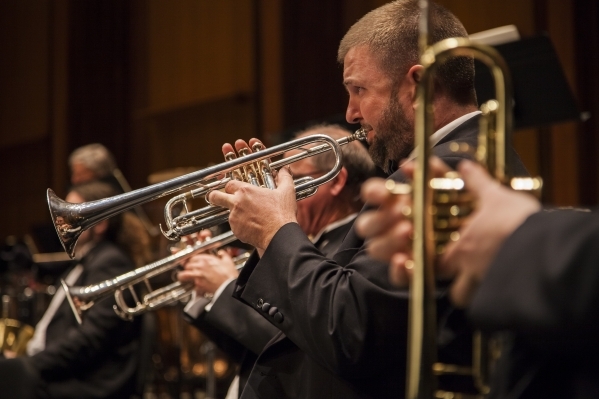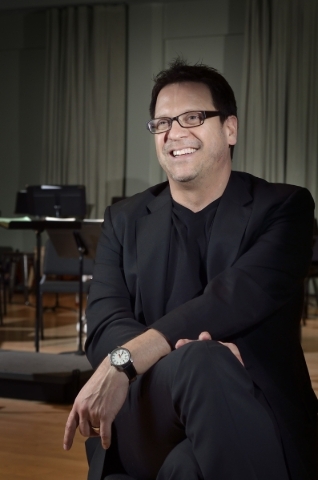Las Vegas Philharmonic promises a ‘great meal’ of music
If at first you don't succeed ...
We all learn from failure. It just takes some of us longer than others.
Composer Sergei Rachmaninoff, for example, waited almost a decade after the disastrous debut of his first symphony to start writing his second — including three years of psychotherapy and hypnosis.
The result, Rachmaninoff's 1908 Symphony No. 2 in E minor, showcases the composer's status as "a great tunesmith" — and his humanity, says Donato Cabrera, the Las Vegas Philharmonic's music director.
Cabrera will conduct the Rachmaninoff symphony, along with Ravel's Piano Concerto (featuring guest artist Martina Filjak) and American composer Mason Bates' "Devil's Radio," in two performances this weekend at The Smith Center's Reynolds Hall.
Rachmaninoff's second symphony presents "one beautiful melody after the next," Cabrera notes. (And even if you don't know the symphony, you probably know one of those melodies thanks to Eric Carmen's 1976 hit "Never Gonna Fall in Love Again," which borrowed its melody from the symphony's third movement.)
As for the "only human" aspect, with "wonderful, amazing artists" — whether composers or performers — "we put them on this pedestal," because of their works of genius, the conductor says. "We lionize them in such a way that we often forget these folks were human."
Yet Rachmaninoff's torment in the late 19th and early 20th centuries led to such "gorgeous melodies and sonorous sounds," Cabrera adds. "One wonders if Rachmaninoff were alive today, if the modern miracles of medicine" were available to him, "would he have that space to write this music?"
Rachmaninoff's dark melodies provide decided contrast with Maurice Ravel's Piano Concerto, which "is full of wonderful witticisms and that French color," according to Cabrera. "It has a little bit of everything."
And Filjak will be "yet another wonderful soloist" joining the Philharmonic, he says.
(The New York Times praised her "brilliance, sensitivity and imagination" in a program that included Ravel's "Une barque sur l'océan" from "Miroirs," during which she "demonstrated striking individuality.")
The Croatian pianist came to international attention by winning the Gold Medal, first prize and the Beethoven prize at 2009's Cleveland International Piano Competition — which led to concert engagements that have taken her around the world. (Good thing she loves to travel, according to her website biography.)
Filjak "was recommended to me by a trusted colleague," Cabrera says, "and after hearing her online, I was very happy to work with her."
Also thanks to the Internet, "we've had a wonderful correspondence online," he adds. "We're really excited to have her here."
Cabrera likens the Ravel concerto's lighter, brighter mood to an "amuse bouche" — an appetizer preceding the full-course musical meal of the Rachmaninoff symphony.
But if there's such a thing as an appetizer before the appetizer, it's the program's kickoff piece: American composer Mason Bates' "Devil's Radio."
It's the second Bates composition the Las Vegas Philharmonic has played under Cabrera; the orchestra performed "Attack Sustain Decay and Release" in September 2014 as part of Cabrera's debut as the orchestra's musical director.
Explaining the title of "Devil's Radio," Cabrera cites Bates' Southern heritage. (The composer hails from Virginia.)
"What I love about the South," Cabrera says, "is they use the English language in a wonderfully florid way. They speak so much in metaphor."
And "Devil's Radio is "a term for gossip," the conductor explains. "It's a crowd of folks gossiping — I love that. It's exactly what this piece has: lovely little murmurings in the woodwinds, then over to the brasses ... "
Overall, this weekend's concerts are "like sitting down for a great meal," says Cabrera, a self-confessed foodie. "It's a lot of a work, but a huge payoff."
Make that payoffs, because "this is the first time we're doing a subscription concert" on two consecutive days, he points out. (The Philharmonic also played two "Snowman" holiday concerts last month.)
Especially with such a challenging program, "you have to pace yourself," Cabrera says. "When you train for a marathon, you never run the full distance. You run many shorter distances — and gain a perspective on your capabilities."
Read more stories from Carol Cling at reviewjournal.com. Contact her at ccling@reviewjournal.com and follow @CarolSCling on Twitter.
Like Neon Las Vegas on Facebook:































